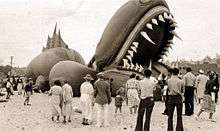Tony Sarg
Anthony Frederick Sarg (April 21, 1880–March 7, 1942), known professionally as Tony Sarg, was a German American puppeteer and illustrator. He was described as "America's Puppet Master", and in his biography as the father of modern puppetry in North America.
Tony Sarg | |
|---|---|
 From a 1921 magazine | |
| Born | April 21, 1880 Cobán, Guatemala |
| Died | March 7, 1942 (aged 61) |
| Occupation | Puppeteer, writer, animator |
| Years active | 1915–1935 |

Biography
Tony Sarg was born in Cobán, Guatemala, to Francis Charles Sarg and his wife, Mary Elizabeth Parker. The elder Sarg, son of Mary Ellen Best, was a consul representing Germany; Parker was English.
The family returned to the German Empire in 1887 [but note conflict that father Franz Sarg remained Consul until 1894]; Sarg entered a military academy at age 14 and received a commission as lieutenant at 17; in 1905 (in his mid-20s) he resigned his commission and took up residence in the United Kingdom, where he pursued a relationship with Bertha Eleanor McGowan, an American he had met when she was a tourist in Germany. They were married in her hometown of Cincinnati, Ohio, January 20, 1909, and returned to England where their daughter Mary was born two years later. In 1914, with the start of World War I, he sent Bertha and the children to Cincinnati, followed them soon after, and settled the family in New York City in 1915.

He had been raised around puppets, inherited his grandmother's collection of them, developed them as a hobby that enhanced the impression he made on other artists, and finally in 1917 turned them into a profession. In 1920, he became a naturalized citizen of the United States. In 1921, Sarg animated the film The First Circus, an inventive cartoon for producer Herbert M. Dawley, who was credited as co-animator. Sarg went on to produce a series of cartoons known as Tony Sarg's Almanac, from 1921 to 1923.[1]
In 1928, he designed, and his protégé Bil Baird built tethered helium-filled balloons up to 125 feet (40 m) long, resembling animals, for the New York institution of Macy's department store, involving a number of issues familiar from puppetry; these participated in the store's Thanksgiving Day parade. In 1935, he undertook the puppet-related work of designing Macy's elaborate animated window display between Thanksgiving and Christmas.
The pinnacle of Sarg's visibility was at the 1933 Chicago World's Fair, where his cumulative audience was 3 million; Baird was involved in this production, as were Rufus and Margo Rose.
Sarg stepped back from competing with other puppet studios, and pursued illustrating magazine covers, guide books, and original children's picture books, games, and toys. He designed salons and swanky interiors for high-end Department Stores, and restaurants,including the supper club at New York's Waldorf Astoria. He designed extensively for the New York World's Fair, in 1939, creating the fair's official pictorial map, and numerous colorful and modernistic fabrics with fair themes for lady's scarves, handkerchiefs, dresses,table linens, and upholstery sold through Lord & Taylor Department Store. His protégé Bil Baird went on to design the puppets in the film The Sound of Music.
On February 17, 1942, Sarg had surgery for a ruptured appendix, and died on March 7, 1942 of complications arising from it.[2] He is buried at Spring Grove Cemetery in Cincinnati, Ohio.
The Academy Film Archive has preserved several of Tony Sarg's films, including The Original Movie, When the Whale Was Jonahed, Why They Love Cavemen, The First Earful, and Why Adam Walked the Floor.[3]
Filmography
All films co-animated and produced by Herbert M.Dawley
- The First Circus (May 8, 1921)
- The Tooth Carpenter (May 21, 1921)
- Why They Love Cavemen (July 2, 1921)
- When The Wale Was Jonahed (August 20, 1921)
- Fireman, Save My Child (September 11, 1921)
- The Original Golfer (January 7, 1922)
- Why Adam Walked the Floor (February 5, 1922)
- The Original Movie (April 9, 1922)
- The First Earful (May 29, 1922)
- Noah Put The Cat Out (July 9, 1922)
- The First Degree (July 29, 1922)
- The First Barber (August 27, 1922)
- Baron Bragg and the Devilish Dragon (September 24, 1922)
- The First Flivver (October 22, 1922)
- The Ogling Ogre (November 19, 1922)
- Baron Bragg and the Haunted Castle (December 17, 1922)
- The Terrible Tree (January 14,1923)
See also
References
- Lenburg, Jeff (1999). The Encyclopedia of Animated Cartoons. Checkmark Books. p. 46. ISBN 0-8160-3831-7. Retrieved 6 June 2020.
- "Tony Sarg is Dead; Artist, Puppeteer" (PDF). The New York Times. New York City. 8 March 1942. Retrieved 21 June 2018.
- "Preserved Projects". Academy Film Archive.
- 2007. "FANFAIR - 31 DAYS IN THE LIFE OF THE CULTURE - Life Sketches -- Tony Sarg's New York Illustrations. The Cultural Divide. Elissa Schappell's Hot Type. My Stuff -- Lauren Bush; A. M. Homes on Lillys New Men's Wear. Krista Smith Exposes the Hotties of Robert Rodriguez and Quentin Tarantino's Grindhous; Bruce Handy Warms Up to Hot Fuzz. Matt Tymauer Has Designs on Moss. Graham Fuller Reviews the Edith Piaf Biopic; Giving Back with Green Jewels. Frank DiGiacomo on the Iggulden Brothers' Lost Childhood; Lisa Robinson Meets The Actual. Leslie Bennetts on Elettra Rossellini Wiedemann's Eco-Education; Amy Larocca on Olivia Chantecaille's Undersea Odyssey; Hot Looks". Vanity Fair. 75.
External links
| Wikimedia Commons has media related to Tony Sarg. |
- Works by Tony Sarg at Project Gutenberg
- Works by or about Tony Sarg at Internet Archive
- 'Letter of Apology to Bert from This Wretch' Tony Sarg Writes from London, by George Korn
- Tony Sarg in Nantucket: Nantucket Historical Association Digital Exhibition
- Photographs of Tony Sarg's Sea Serpent on Nantucket
- Tony Sarg on IMDb